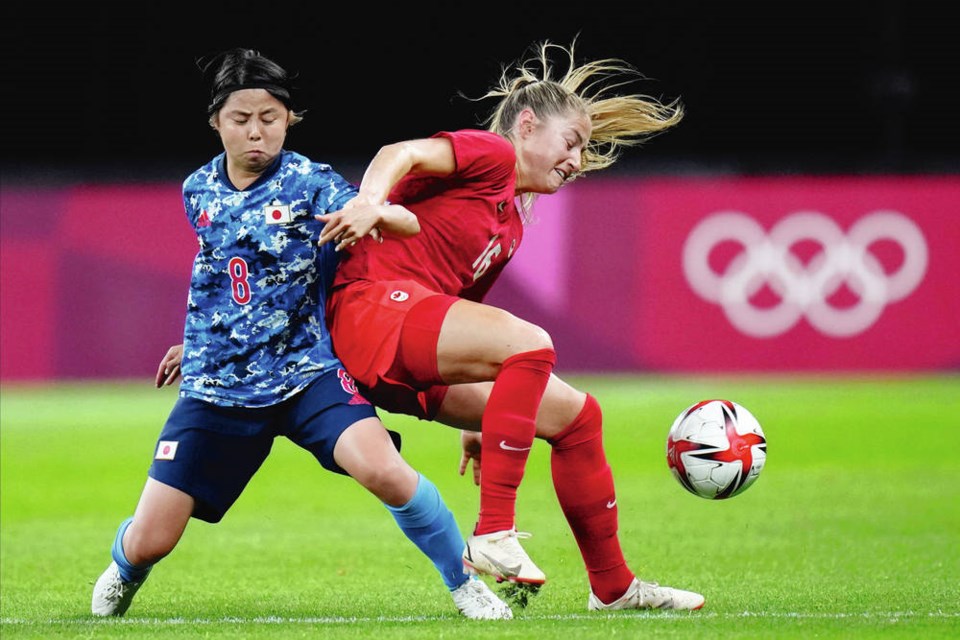A University of Victoria associate professor who teaches a course on the history of the modern Olympic Games is calling the decision to go ahead with the Tokyo Olympics “reckless.”
“Polls show the great majority, up to 80 per cent, of the Japanese public don’t want it to happen,” said Christine O’Bonsawin, PhD, an associate professor of history and Indigenous studies at UVic.
“The decision is financially based. This is a money-generator and that’s what we are seeing happening in Tokyo right now.”
The International Olympic Committee derives 73 per cent of its income from TV broadcast rights and another 18 per cent from sponsors who rely on that broadcast exposure — potentially one reason why the 2020 Tokyo Summer Games, already postponed from last year, are going ahead as a made-for-TV studio event. No fans are being allowed into the Olympic venues due to COVID concerns.
Tim Ryan of Victoria, a retired broadcaster who covered 10 Olympic Games for American networks CBS and NBC, said billions of dollars are at stake, paid for by TV rights, which are the driving financial force. “And money talks, as always,” he said.
Canadian Olympic athletes are fully vaccinated, like about 85 per cent of the competitors in the Tokyo Athletes Village. At least 67 people associated with the Games have tested positive since arrivals began July 1. Four athletes, of the 11,000 expected in the Village, have tested positive so far.
Japan has been averaging 3,000 cases a day, low by some standards in Europe and North America, but only about 20 per cent of the country is fully vaccinated.
Ryan, who covered 10 Summer and Winter Olympics, from Albertville in 1992 to London in 2012, said he has mixed feelings about the Tokyo Olympics. “I am leery about the COVID situation there. But it takes a whole lot to get to the Games and I would hate to see all the athletes’ hard work and preparation go for nothing if the Games were cancelled.”
O’Bonsawin, who has lectured and written widely on the Olympics, says she, too, is conflicted about the Tokyo Games, set to begin with an opening ceremony at 3:30 a.m. Pacific on Friday. Langford-based former UVic Vikes rugby star Nathan Hirayama is to carry in the Canadian flag along with basketball team player Miranda Ayim.
“The one argument for the Tokyo Games to go ahead are the athletes themselves, especially in the lesser sports, and the work and dedication they have put into reaching this moment.”
More than 75 Island or Island-based athletes will be competing in the Tokyo Olympics and Paralympics. The competition has already begun, with infielder Emma Entzminger of Victoria part of Canada’s 4-0 victory over Mexico in softball on Wednesday.
None of the Island athletes headed to the Olympics interviewed by the Times Colonist expressed health misgivings about competing in Tokyo. “We have a plan laid out and have lots of protocols in place. We’re ready to go. There are no concerns for us,” said Kenzie Priddell, a member of the Canadian Olympic artistic swim team, which is in Victoria this week training before departing for Tokyo.
Teammate Audrey Joly concurred: “The COC has worked really hard to keep us safe and there are so many protocols. We trust the process and I don’t believe they would send us somewhere that isn’t safe. I’m not concerned.”
Overall, however, O’Bonsawin said resistance to the Olympics is growing, adding the Games are not financially viable for host cities or host nations. “They are viable only for the IOC.”
She also pointed to the threat of boycotts surrounding the 2022 Beijing Winter Olympics because of China’s human rights record, including the persecution of its Uighur Muslim minority, and a “resistance among the unhoused in Los Angeles” over the 2028 Summer Games.
She said she was “very surprised” that an Insights West poll of 883 British Columbians from April 28-30 showed 55 per cent support for the idea of a 2030 B.C. Winter Olympics bid, which could include several Island venues. That climbed to 77 per cent support if the Games could be staged without public funding.
“There is obviously value in sports and a desire to see competition on the world stage. It’s not going away,” said O’Bonsawin.
But she wants to see changes, including permanent homes for the Olympics — one for the Summer Games and one for the Winter Games.
“It’s not a perfect model but it’s the one that best takes into account the environment and sustainability.”
Ryan says the future of the Olympics is all about the money, with TV as the driving force. “If the Games remain saleable to advertisers, they will continue going.”
— With a file from Canadian Press



